Artichokes — Nutrients, Health Benefits, and Shopping Tips

Written by Listonic Team
Last update on September 4, 2024
Nutrients
Nutrition facts
Amount per 100 g
Calories
🔥 53 kcal
| Nutrients per: 100 g | Value | % Daily Value* |
|---|---|---|
| Carbs | 12 g | 4.36% |
| Fiber | 5 g | 17.86% |
| Sugars | 1 g | 2% |
| Glycemic Index | 15 | - |
| Protein | 3 g | 6% |
| Sodium | 94 mg | 4.09% |
| Total Fat | 0 | - |
*The % of Daily Value (DV) tells you how much a nutrient in a serving of food contributes to a daily diet. 2,000 calories a day is used for general nutrition advice.
5 g
🥔 Good Fiber Content
15
🟢 Low Glycemic Index
Key takeaways
Health benefits
- Rich in antioxidants, which help protect the body from free radicals and reduce the risk of chronic diseases.
- Supports liver health by promoting detoxification and protecting the liver from damage.
- Promotes digestive health due to their high fiber content, which helps maintain regular bowel movements.
- Contains essential vitamins and minerals such as Vitamin C, folate, and magnesium, which are important for overall health and well-being.
Health risks
- Allergic reactions especially in individuals with allergies to plants in the Asteraceae family, causing symptoms like itching and swelling.
- Digestive issues such as gas or bloating, particularly when consumed in large amounts.
- Potential for choking on the tough, fibrous parts if not properly prepared or consumed.
- Interaction with medications especially those affecting liver function, as artichokes can influence liver metabolism.
How to choose artichokes
Good artichokes feel heavy for their size and have tight, compact leaves with a healthy green color. A fresh artichoke will squeak slightly when the leaves are squeezed together, signaling crispness and freshness.
Do not choose artichokes with opened or dry leaves, as these are signs that the artichoke is past its prime. Artichokes showing signs of browning or withering should also be avoided.

How to store artichokes
Fresh artichokes are best stored in the refrigerator. Placing them in a plastic bag with some holes for ventilation can help maintain freshness. They can last up to a week when stored properly in the crisper drawer.
Do not wash artichokes before storing, as moisture can cause them to spoil faster. Avoid keeping them near ethylene-producing fruits like apples and bananas, which can accelerate ripening and spoilage. Keeping artichokes dry and cool is key to preserving their quality.
✅ Extra Tip
How long do they last?
Fresh artichokes can last for 1-2 weeks when stored in the refrigerator. To keep them fresh, store them in a plastic bag with a slightly damp paper towel. Cooked artichokes should be consumed within 3-5 days when refrigerated.
What to do with leftovers?
Leftover artichokes can be used in a variety of dishes. Add the cooked hearts to salads or pasta dishes for a touch of earthy flavor. They can also be stuffed with breadcrumbs, cheese, and herbs, then baked for a delicious side dish.
Artichokes are excellent in dips, especially when combined with spinach and cream cheese. You can also puree them into a soup or mix them into a vegetable stir-fry. If you have leftover steamed artichokes, try grilling them with olive oil and garlic for a smoky finish. They can also be chopped and added to grain bowls or used as a topping for pizzas and flatbreads.
👨⚕️️ Medical disclaimer
How artichokes support specific health conditions
Artichokes offer a variety of health benefits, including promoting liver health through their detoxifying effects and bile production stimulation. Their fiber content supports digestive health by aiding regular bowel movements, and their antioxidants can improve heart health by lowering cholesterol and reducing inflammation.
Discover products from other categories
Listonic Team
Fact-checked
Our editorial team checked this article to make sure it was accurate at the time of publishing it.
Get the top-rated shopping list app

artichokes







